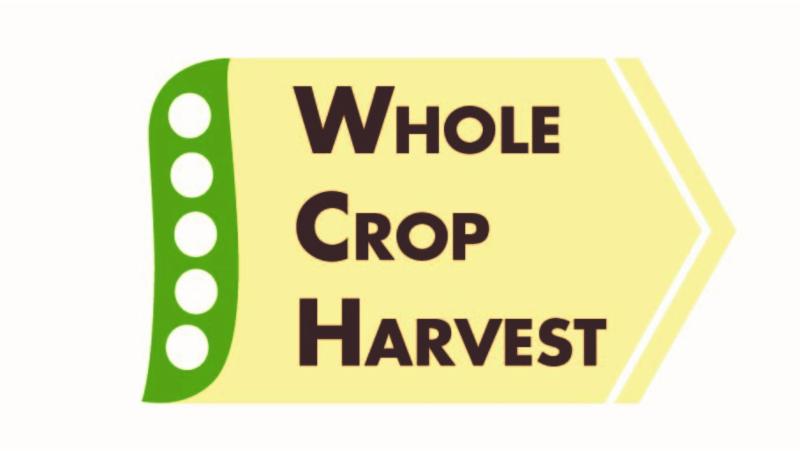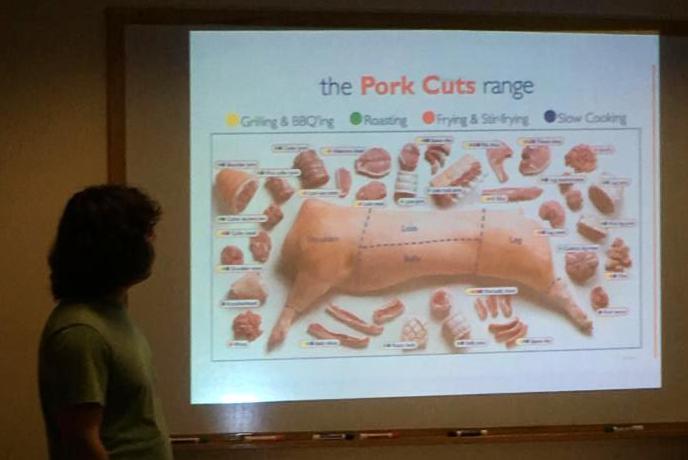|
CEFS Supply Chain Initiatives
|
|
|
|
|
Food and Farm Business Development Webinar Series
|
|
|
---------------------------
Missed a webinar in our series? No problem! All webinars are available on our
YouTube channel
!
|
|
|
|
How It Works Handbook: A Guide to University Food Systems & Local Food Programs
|
|
|
Greetings!
Welcome to the first quarterly issue of CEFS' Supply Chain Initiatives Newsletter. This newsletter builds on the monthly newsletter that has chronicled the work of the USDA-funded NC Growing Together project since 2013. Going forward, we will report on supply chain networking, capacity building, and the research and extension work of all of CEFS' supply chain and business development initiatives. Enjoy!
Sincerely,
Rebecca Dunning, Ph.D.
Lead, Supply Chain Initiatives, Center for Environmental Farming Systems
Research Assistant Professor, NC State University Department of Horticultural Science
|
|
UFOODS Supports Value Chain Collaboration to Bring Local Food to Campus at UNC-Pembroke
|
|
|
|
|
Farmer Millard Locklear, Chef Glenn Reynolds of UNC-P, and Davon Goodwin of Sandhills AgInnovation Center (L-R).
|
The goal of the University Food Systems (UFOODS) initiative is to contribute to the building of local food systems in North Carolina by demystifying complex university food purchasing systems, identifying entry pathways for local foods, and building supply chain connections to bring products to campus. The initiative, a project of the Center for Environmental Farming Systems and the NC 10% Campaign, is working with six partner universities in North Carolina, including the University of North Carolina at Pembroke (UNC-P).
This past year, UFOODS worked with UNC-P Executive Chef Glenn Reynolds and produce wholesale/distributor FreshPoint to increase local sourcing for campus dining. The result of this collaboration? UNC-P more than doubled their year-over-year percentage of local produce (defined as sourced within 250 miles) purchased through FreshPoint, from 3.35% to 8.9%. This increase in just one year shows strong potential for increasing local procurement on a larger scale.
It helped that UNC-P has a supportive administration. UNC-P Executive Chef Glenn Reynolds says that he had support from as far up as the Chancellor to pursue local foods sourcing for campus dining halls. The challenge was finding it, and figuring out how to get it through their authorized produce
vendor, FreshPoint.
UFOODS project staff facilitated meetings and ongoing follow-up over the course of a year to connect farms located within 10 miles of campus into the produce supply chain serving UNC-P. The UFOODS team also included a local foods intern, Julia Sampson, funded through UNC-P's Sustainability Office. "Julia has really been instrumental to all this," says Chef Reynolds. "She is constantly speaking with farmers, recruiting farmers - she's definitely persistent."
|
|
 |
|
Julia Sampson and UNC-P students at a UFOODS meeting.
|
 |
Student advocacy was also a critical ingredient. "
With agricultural fields so close to campus, UNC-P students understand how strong local food systems can support the local community, and are committed to connecting the dots of local economic development with sustainable farming practices. We have always been so impressed with the students at UNC-P, as well as the dedication from UNC-P's Sustainability Office and faculty who go above and beyond to support these students and raise up UNC-P as a statewide and national model of sustainable programming," says Robyn Stout, statewide coordinator of the NC 10% Campaign.
Because UNC-P's Sodexo-managed dining operations hold exclusive contracts with particular authorized vendors, one strategy to increase local food in dining is for local farmers to sell to FreshPoint,
which then supplies the produce to UNC-P. "The farmers meet the [FreshPoint] truck at UNC-P on Friday, and the produce is back here on Monday," says Chef Reynolds.
 |
|
 |
FreshPoint's Lauren Horning and Millard Locklear. |
"Trucking the product to FreshPoint's warehouse and then back to UNC-P might seem inefficient," says Rebecca Dunning, UFOODS team lead. "But it complies with the university and distributor practices, saves farmers the expense of trucking the product to Raleigh, and creates the opportunity for local farmers' products to be sold to other FreshPoint customers."
To share insights learned over the past year, Dunning, Chef Reynolds, and FreshPoint's Local and Organic Marketing Specialist, Lauren Horning, presented a session entitled "Dining and Distributor Collaboration for Authentically Local Sourcing" at the National Association of College and University Food Services Southern Regional Conference on March 6 in Denton, Texas.
F
or more information about UFOODS, please visit
www.ufoodsnc.com
, or for general resources on farm-to-institution procurement, visit the NC 10% Campaign.
|
New CEFS Initiative Tackles Farm-Level Food Loss
|
|

The goal of the Whole Crop Harvest initiative is to discover ways to recover and utilize produce that would otherwise not leave the field or packing shed. The project complements CEFS' other supply chain initiatives, particularly
NC Growing Together
and
UFOODS
. All of these projects strive to build supply chain capacity and profitable relationships between small/mid-scale food producers and conventional retail and food service markets.
Food waste is a major challenge in the U.S. food system. It's estimated that 40% of food is lost across the supply chain, from the farm through distributor, retailer or food service, and to the consumer. However, those estimates leave out farm-level losses.
 "A significant amount of healthy, nutrient-dense fruit and vegetables is left unharvested, representing losses of water, inputs, and land," says NC State University graduate student Lisa Johnson. Measuring, understanding the underlying reasons for, and ultimately reducing farm level production losses can benefit the environment and the profitability of the grower. "A significant amount of healthy, nutrient-dense fruit and vegetables is left unharvested, representing losses of water, inputs, and land," says NC State University graduate student Lisa Johnson. Measuring, understanding the underlying reasons for, and ultimately reducing farm level production losses can benefit the environment and the profitability of the grower.
Johnson, a Ph.D. candidate in the Horticultural Sciences Department, is part of Whole Crop Harvest's interdisciplinary project team of horticulturists, economists, sociologists, and agricultural engineers. Based on Johnson's trials in 107 fields on 10 farms, the team developed an
easy-to-use protocol
enabling farmers to more accurately estimate quantities of unharvested produce in their fields. Based on that information, farmers can inform buyers or food donation sites and then make an informed decision on the costs and benefits of continuing to harvest the field.
"We're examining what is actually economically feasible for the grower -- and what needs to happen further downstream in the supply chain -- to move more product out of the field," says project PI Dr. Rebecca Dunning.
|
NC Choices Supports Whole Animal Purchasing Through Supply Chain Education and Capacity-Building
|
|
|

NC Choices, an initiative of the Center for Environmental Farming Systems in collaboration with NC Cooperative Extension, is supporting efforts to increase whole animal purchasing in North Carolina. Whole animal purchasing is when a farmer is able to sell his or her entire animal to one buyer -- for example, a meat aggregator, meat buying club, or butcher. That buyer then finds end markets for the animal's various cuts and parts.
Whole animal purchasing benefits farmers in that they don't have to spend time marketing their meat, and is especially beneficial for rural farmers who don't have ready access to markets outside of urban centers. It puts the responsibility on the buyer or aggregator to move all the parts, and reduces waste by allowing the buyer to utilize fat, bones, and trim that might have otherwise been lost in further processing.
 "A 250 pound live pig might yield only about 125 pounds of packaged meat. The more the meat is broken down, the more of the animal's weight is lost. Farmers can't afford to just sell the popular cuts -- to be profitable, they need to sell as much of that meat as possible at a premium," explains NC Choices Director Sarah Blacklin.
In February, NC Choices partnered on a retailer training at
Weaver Street Market, a cooperative grocery store with three locations in North Carolina's triangle. The staff training focused on understanding how the retailer fits into the larger context of whole animal buying, and how employees can talk about their pasture-based meat program to customers. Other speakers at the training included farmers from the NC Natural Hog Growers Association, Emily Moose from A Greener World's Animal Welfare Approved certification agency, and meat aggregator Sam Suchoff from The Pig Restaurant and Lady Edison Meats.
"The idea for this training came to me while I was meeting with Sam [Suchoff] to talk about improving the local meat supply chain," says Carolyn Twesten, Weaver Street Market Produce and Meat Merchandiser. "In listening to Sam talk about his processes I realized how much effort goes into whole animal utilization, especially at his scale. In retail the staff just see the product come out of the box, they don't see the whole process of what it took to get the product to the shelf. I am trying to connect our staff with that process as much as possible, to engage them and in turn have them engage our customers."
"Weaver Street Market is playing an integral role in making whole animal buying possible - they're purchasing various parts so aggregators can move whole animals," adds Blacklin. "It's a really great model we like to see when we talk about scaling up local meat."
 NC Choices, with support from NC Growing Together and the Golden Leaf Foundation, has also created a suite of
consumer-focused resources to build awareness of and demand for pastured meat on the consumer side of the supply chain.
This spring, the NC State University College of Agriculture and Life Sciences will feature NC Choices' meat label claim resources as part of its Homegrown video series! Look for it to appear here:
https://cals.ncsu.edu/homegrown/
For more information about NC Choices, please visit
www.ncchoices.com.
|
|
|